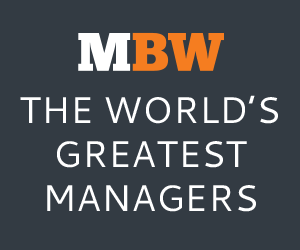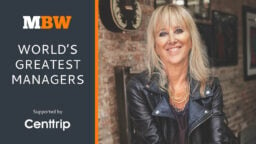MBW’s World’s Greatest Managers series profiles the best artist managers in the global business. Here, we speak to Sal Slaiby, a hugely successful music entrepreneur and the manager of superstars ranging from the Weeknd to Swedish House Mafia and many more. World’s Greatest Managers is supported by Centtrip, a specialist in intelligent treasury, payments and foreign exchange – created with the music industry and its needs in mind.

In 1996, Wassim ‘Sal’ Slaiby gave his mother a hug, and said goodbye. They both knew this might be the last time they ever saw each other.
Aged just 16 years old, Slaiby was escaping his home country of Lebanon, then in the grip of a violent civil war, having already lost his father six years prior.
First, Slaiby boarded a boat to Cyprus. Then he grabbed a one way plane to Germany, and then another to his ultimate destination – Canada.
He had $9,000 plus change in a satchel, donated by his mom… and nothing else.
“I’ll never forget when that Canadian customs stamp went ‘pop pop’ in my passport, and I just kept walking through [immigration],” he says today.
“I was 16 years old and barely spoke English. I still remember that customs person; I could draw his face for you now.”
There are a plethora of remarkable things about Slaiby’s life from this moment on – not least the fact he raised himself up from sleeping on the streets of Montreal to become one of modern music’s most successful global entrepreneurs (the details of which we’ll come back to).
But perhaps the most remarkable of all the remarkable things about Slaiby is his smile.
Throughout an hour-long interview with MBW – much of it to discuss his new Arabic Music label JV with Universal – Slaiby barely drops his cheering grin once. Even when discussing memories of growing up against the backdrop of a deadly conflict, or the momentous risk of leaving his homeland behind, it hardly fades.
“I still remember that customs person; I could draw his face for you now.”
Slaiby carries with him the kind of evergreen gratitude that results from experiencing adversity beyond the limits of most of our comprehension. This gratitude is helped on its way by Slaiby’s abundant professional success (he’s not only now reunited with his mom, but also bought her a beautiful house right next to his own in California.)
Then again, maybe Slaiby’s infectious optimism is simply innate. He says of his time as a homeless teenager: “As my friends from back then would tell you, I was the happiest guy sleeping on the sidewalk.”
And it was on the sidewalk that Slaiby’s career in music began. Having moved from Montreal to Ottawa in his late teens, Slaiby overheard a rapper – Belly – spitting rhymes into the open air. Having expressed his admiration for the artist, Slaiby became his manager.
Then, in 2003, Slaiby and Belly (Ahmad Balshe) co-founded Capital Prophet Records, later known as the CP Music Group, which grew into one of the biggest indie hip-hop and R&B labels in Canada. Slaiby sold CP Music Group to Live Nation a decade later, to concentrate his efforts on his new management client – The Weeknd.
Today, Slaiby’s sprawling music empire puts most other entertainment businesses in the shade.
First, there’s XO, the independent record label Slaiby founded with The Weeknd aka Abel Tesfaye, Amir “Cash” Esmailian & LaMar Taylor.
XO works in partnership with Republic Records and Universal Music on The Weeknd’s output, including his smash 2020 album After Hours. (The Weeknd was famously – unbelievably – robbed of Grammy nominations for the record, but he finished 2020 as UMG’s biggest revenue-generating artist worldwide.)
There’s also SALXCO, under which Slaiby manages or co-manages The Weeknd, Doja Cat, Bebe Rexha, French Montana, Ty Dolla $ign and many more. In a major coup for the business, Slaiby has this year added Swedish House Mafia to his world-beating management roster.
The most recent addition to Slaiby’s business interests, though, has a truly special place in his heart. Universal Arabic Music (UAM) is a partnership between Universal, Republic Records and Slaiby, with a mission to surface the best Arabic music and make it connect worldwide.
UMG is taking UAM’s prospects seriously – at the highest level. Sir Lucian Grainge said of the label: “There is so much talent in this part of the world that with Sal’s incredible experience and intimate knowledge of the MENA region, alongside his track record for helping to break global artists, he will bring a unique vision, strategy and power to Universal Arabic Music.”
Early signings at UAM include 17-year-old Jordanian singer/songwriter Issam Alnajjar, and 19- year-old Palestinian-Chilean singer/songwriter Elyanna, who has won comparisons with Rihanna.
Here, MBW chats to Slaiby about why promoting the music from the region of his birth matters so much to him – and about his amazing rise through the industry’s ranks…
Do you feel that the Arabic music scene is currently underrepresented in the global music industry?
Obviously, I believe that Arabic music is not looked on at the high level I think it deserves globally. But at the same time, there hasn’t been a strong infrastructure for it. So I’m hoping first to build the infrastructure with Universal Arabic Music – to be the start of that [process] over the next five years or 10 years.
When I brought the idea to the [Universal] team, it was a pretty aggressive [response]: ‘We love the idea, let’s put [UMG’s] name, the logo, and embed the word “Arabic” in it.’
“Even if another label breaks the biggest Arabic star globally, I’ll be the first person to applaud.”
It wasn’t just ‘let’s call the label Desert Storm’ or something. It was, ‘How do we take this global machine, Universal Music Group, and have them get behind Arabic music in every way?’
I hope this is going to be the start of many other music companies looking at great talents from different regions and from a different culture. Even if another label breaks the biggest Arabic star globally, I’ll be the first person to applaud.
You’ve been involved in another Middle Eastern music success story for some time – the streaming service Anghami, which is FLOATING IN THE US via a SPAC deal. Has that set the scene for what you’re now doing with UAM?
Absolutely. Anghami has proven that Arabic fans are very loyal, and that they love Arabic music and culture. If Arabic fans love someone they will just press play over and over and come to a show.
I’ve seen how important the Middle East region is becoming for touring – the music and the finances are massive in the region now, and I feel like this is just the beginning.
We’re trying to spread the love and spread the culture in a positive way because for years it has been looked at in a negative way and I hate that; it really breaks my heart.
Is that a personal mission for you? Ensuring Arabic music and culture is no longer treated as a second-class citizen – or a negative story – by the world’s media?
It’s just who I am.
When you understand your culture well, when you grew up in it – I speak Arabic myself – you look at things very differently.
“Politics is death to every culture, regardless of color. You want to separate people? Just bring a politician in the room.”
Literally sometimes I just stare at the news and I have no feeling; it’s like, what is that?
Politics is death to every culture, regardless of color. You want to separate people? Just bring a politician in the room.
You left Lebanon at 16 to emigrate to Canada. Had most of us left behind as violent a situation as you did, we might find it hard to fall back in love with the place we were born. The reaction might be closer to anger or sadness rather than affection. How have you managed to move past that?
In our office, the first thing you see is a neon light, and it says: ‘Fuck your bad vibes.’ Does that answer your question enough [laughs]?!
I give this real advice to everybody: no matter what the hell’s going on today, you might feel like the whole world is literally falling on you, wait three days, or five, or six, and you’ll see – things are only gonna get better.
“In our office, the first thing you see is a neon light, and it says: ‘Fuck your bad vibes.’”
That happened to me so many times at such a young age that by the time I was 25, 30 making decisions on my own, I became a pro.
I grew up in the war in Lebanon. I lost a lot of family members and I couldn’t wait to leave. So from age 16 I learned how to rebuild my life. I’d lost my father, and my mom helped me escape the war. By the time I got to Canada by myself, I had to figure out everything from how to get a social security number, all the way to getting food, where to sleep, how to call my mom – there was no Facebook, Instagram, FaceTime, there was nothing.
Managing artists fits nicely with that. The artistic temperament can often ride side-saddle with a range of emotions, and there’s a stereotype – not always true – that artists can get a little scatty.
I don’t expect an artist to come to me and have their shit organized – that’s what I’m here for.
I expect an artist to come to me with a vision, and to want to do this for the right reasons.
“I always say: compared to other problems I’ve seen in my life, music business problems are easy.”
I tell all my clients: ‘At some point in your life, you’re not just an artist – you’re a business. And that needs taking care of.’ As for the rest of it, we just have fun, man.
I always say: compared to other problems [I’ve seen in my life], our problems are easy. We’re in the music business, I mean, come on! We’ll figure it out.
The business you’ve built at XO with Abel is testament to your approach, not only to management, but also working closely with artists so they can become entrepreneurs.
Abel, even when I met him at a young age, I’ve always watched him make the right decisions. He’s always amazed me like that.
I feel like we learn from each other; we make each other better. With Abel, our partnership is beyond just making music; we feed off each other.
What do you think the key ingredients have been for Abel to break through and to maintain his career at the very top of the industry worldwide?
He’s a visionary person, and he’s always working on the next thing. I think what’s going to keep him getting bigger and bigger, is just focusing on his music. We always admire and appreciate all the recognition he gets. And when we don’t get the recognition, where it feels like it was rigged, you’ll hear us get loud. I’m sure you know what I’m talking about [laughs]!
This is just the beginning for Abel. We have a lot of new stuff to come out. We’re focusing on music, creating a whole new formula – a whole new way of thinking and marketing. We’re about to start experimenting, launching stuff and seeing what works and always working to connect more with the fans globally.
You’ve had huge success with XO teaming up with Republic Records as a partner. Why did you choose Republic again for the launch of Universal Arabic Music?
Monte and Avery [Lipman] are very special to us. We’ve been together for 10 years together, and it’s a relationship built on success, respect, and the same vision. They’re like the dream partner, not just for the Arabic label but in everything.
“Mine and Abel’s relationship with Lucian is very very close; we consider him family, someone that we make decisions with and we reach out to.”
Also, mine and Abel’s relationship with Lucian is very very close; we consider him family, someone that we make decisions with and we reach out to.
We’re very organic people – either we connect with you or we don’t.
From Monte to Avery, Lucian and Vivendi, they have proven to us over the years why they are the right partners. We are loyal to them and it’s a real relationship.

There’s a lot of talk in the industry about going independent vs. the big operations of the major music companies. The way you talk about Universal doesn’t fit the big, bad machine stereotype.
If a deal between two people is not fair, it will never work out; it can become nasty at any point.
I always look at it this way: you can’t be married to someone when the other person’s miserable and you’re like the happiest person alive. You’re going to make the other person crazy.
An artist, label and manager relationship has to be built on fairness, trust, and understanding. And as long as everybody’s being compensated the right way, that’s possible.
“I always look at [record deals] this way: you can’t be married to someone when the other person’s miserable and you’re like the happiest person alive. You’re going to make the other person crazy.”
I believe you can find always a way forward, a solution, you’ve just got to open your eyes and see it. And that’s why I say keep the bad vibes away, the negativity away.
Our partnership [with Republic] is so strong and healthy because we both know what we need from each other. We’ve spent years developing that relationship, that business vision, together.
Another person in a different situation might [have a deal with a major and] be like: ‘I’m getting killed! I’m making no money!’ I always advise everyone, do not sign anything without having a lawyer; don’t ever put yourself in a bad place just because you’re excited for that moment.
My first [distribution] deal I signed for a label [CP Records ] was 90/10. Ninety to us and ten to them.
Most people start off in the music business signing deals that are more like keeping 10% rather than 90%!
Yes. But you know what? I didn’t ask them to do 50% of the work – I asked them to only do 10% of the work. And everybody was very happy.
This was a label I started in 2003 and about 10 years later I sold it to Live Nation, probably one of the biggest ever independent labels sold in Canada.
Around that time, I met Abel and got into the management business. And what was beautiful about that was [I’d developed] so much experience being a label guy, I was able to understand the label side.
I knew how to make them happy, but also make sure the artist is happy and treated A-list in everything – from finances to his career to the marketing to radio team etc.

I read a FORBES INTERVIEW with you where you clearly have a lot of happy memories of your upbringing in Lebanon and the impact music had on your life.
My mom raised us with love, and my father was like: ‘You don’t want to go to school today? Don’t go! You wanna come with me to work? Let’s go!’
My mom was heartbroken and damaged, to be honest with you, in every way after my father passed away. But me, my sisters and my mom were very close, and we’d listen a lot to music: We’d listen to Cheb Khaled – one of the greatest artists from the region. We’d also listen to Michael Jackson, Queen, and many others.
“By the time I moved to Canada, there were no bombs, life was normal. As my friends from back then will tell you, I was the happiest person sleeping on the sidewalk.”
Even during the hardest times for us, you’d think, ‘Look at these guys, they’re crazy! There’s a war going on and they’re eating and playing music.’ But, you know, what else are you going to do? After a while you give up; you can’t just be sad and angry all the time.
By the time I moved to Canada, there were no bombs, life was normal. As my friends from back then will tell you, I was the happiest person sleeping on the sidewalk.
If you could go back now in a time machine what would be the key piece of advice that you tell yourself?
Honestly, I would just tell myself to stop at the right moments and just enjoy it.
I never really got to do that. I still don’t really know if that’s a good thing or a bad thing.
Do you think your decision to leave home at 16 – to get to Cyprus, then to Germany, then Canada – affects the way you approach business at all today? It’s an astonishingly brave/determined thing to do, not only to leave home and get to Canada, but to then climb as high as you have as an entrepreneur in music.
I’m 41 now, I’ve got nephews and nieces, and I still can’t believe that at age 16 I convinced my mom to let me leave. I look at someone at 16 now and I’m like, ‘I wouldn’t give you my car keys!’
I begged my mom every day to let me go – she was thinking I’d forget about it after a week or two, but I never did.
“When I arrived in Canada, I went to eat at McDonalds. Then I went into the bathroom and counted the money my mom had given me to make sure I’d only spent $4. I use that memory every day in my life.”
I arrived [in Canada] by myself. All I had was a case, my suitcase and a little pouch with some money in it.
When I arrived, I went to eat at McDonalds. Then I went into the bathroom and counted the money my mom had given me over and over again to make sure I’d only spent $4. I use that memory every day in my life.
I didn’t believe that was all I’d come for; I felt I could give more. I didn’t plan this [career] – I’m not a guy who sits there and writes out plans. I go by my gut feelings and my surroundings.
I’m just so happy I get to do this now with the team I started with, all my friends. We grew up with one another and we’re here now, together.





